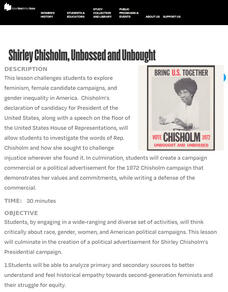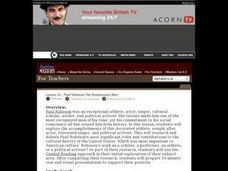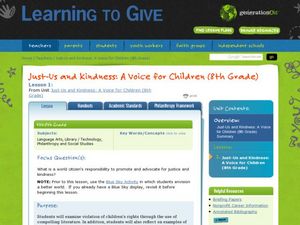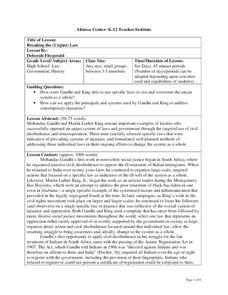PBS
“He Named Me Malala”: Understanding Student Activism Through Film
Malala Yousafzai has become the face of social activism. After watching He Named Me Malala and short student-made films about what young people can do to become instruments of change, class members reflect on what it means to be an...
Smithsonian Institution
Resistance to School Desegregation: The Boston Busing Crisis
Despite how it sounds, Boston's busing crisis wasn't a transportation problem. Academics address the problems faced by African Americans following school desegregation and the struggle to receive equal educational opportunities. Scholars...
Curated OER
Wages, Earning Power, Profit, and Responsibility: International Lessons
Students participate in an interactive activity to determine where their clothers were made. They examine the lives of children from Latin America who harvest crops in the fields or manufacture apparel in factories.
National Woman's History Museum
Women, Education, Sports, and Title IX
Title IX did more than change the face of sports in the United States. This landmark legislation also impacted women in education and politics. High schoolers examine the text of the legislation and the 2016 Senate resolution and watch...
National Woman's History Museum
Shirley Chisholm, Unbossed and Unbought
An engaging resource introduces young historians to Shirley Chisholm, the woman, the Black congresswoman, the activist, and the candidate for President in 1972. Class members study primary sources, watch a video of her announcing her run...
Curated OER
Music Motivates
Students listen to songs from the Civil Rights movement. They explain how the music might have inspired African-Americans to be activists in the movement. They examine how the Civil Rights movement affected the common good.
Curated OER
Brother Outsider
Students view the film "Brother Outsider" and read an article by Bayard Rustin as springboards to discuss the concept of civil rights in the United States. They follow a discussion guide.
Curated OER
Philanthropy and You
Learners identify human rights and study the values of historical figures who fought for human rights. In this human rights lesson, students define the term human rights and research examples of human mistreatment in history. Learners...
Curated OER
Getting To Know the Activists Among Us
Students discuss what it means to be an "activist." They identify various types of activist organizations and brainstorm the names of local people and organizations that might fit these categories. They research one of these...
Curated OER
Stories of Students Who Took Action: Human Rights
Students read stories of young human rights advocates and discuss examples where young people made a difference. They consider local problems, relate them to human rights principles and role-play possible solutions.
Curated OER
Dubois and Washington Venn Diagram
Students compare and contrast the visions of W.E.B. Dubois and Booker T. Washington. In this African American history lesson, students read biographies about both men and create a Venn diagram about the men.
Teaching Tolerance
Dismantling Racial Caste
It's time to end racism. The final installment of the series encourages scholars to consider what is needed to ended the racial caste system in the U.S. Young historians complete group discussion, written prompt, and a hands-on-activity...
Curated OER
Freedom's Children
Learners role play a story from from Freedom's Children: Young Civil Rights Activists Tell Their Own Stories. In this segregation activity, students work in a literary circle to create a role play to present to the class. Each student in...
Curated OER
Darfur Now Lesson Four: The Messages of Darfur Now
Students explore the work in individuals that are part of Darfur Now. In this human rights lesson, students also analyze the message of Weisel's Not on Our Watch. Students create found poems pertaining to social responsibility and activism.
Curated OER
Lesson Plan on Indigenous Children
Students explore indigenous, traditional and tribal cultures--their rights, protections by law, and obstacles as a people. In groups, they form their own activist groups to contribute to the global effort to preserve indigenous cultures.
Curated OER
Paul Robeson: The Renaissance Man
Students research the life of athlete, actor, singer, cultural scholar, author, and political activist, Paul Robeson. They answer the question, "Which was most important to American culture -Robeson's work as a scholar, a performer, an...
Curated OER
Rosa Parks
Students examine the actions of Rosa Parks. They identify the reasons why philanthropy is good for the community and individuals. They write a letter to someone they admire because of their qualities.
Museum of Tolerance
The Price of Personal Responsibility
A reading of Patrick Henry's "Speech in the Virginia Convention," Henry David Thoreau's "Civil Disobedience," and Rev. Martin Luther King, Jr.'s "Letter from Birmingham Jail" launch a discussion about the price one is willing to pay to...
Curated OER
Just-Us and Kindness: A Voice for Children: King Day
Eighth graders investigate philanthropy. In this service learning lesson, 8th graders read human rights literature and use information gleaned to discuss children's rights around the world. Students discuss scenarios meant to prompt...
Stanford University
Beyond Vietnam
On April 4, 1967 Martin Luther King, Jr. delivered his speech "Beyond Vietnam." The controversy that followed is the focus of a three-lesson unit that asks class members to consider the political and social implications of King's stance.
Roy Rosenzweig Center for History and New Media
Rosa Parks and the Montgomery Bus Boycott
Participants examine two documents related to Rosa Parks and the bus boycott, sources that challenge some of the commonly held preconceptions about Rosa Parks. They then respond to discussion questions to reinforce understanding and...
Curated OER
Breaking the Unjust Law
Students consider the concept of civil disobedience. In this lesson on changing unjust laws, students use primary sources to understand how Gandhi and King changed the law. Students will then list laws that they feel are unjust and plan...
Center for Civic Education
Martin Luther King Jr. and the Power of Words
It is easy to forget the power that written or spoken word can have in effecting change. Using quotations from such inspirational leaders as Maya Angelou, Mahatma Gandhi, and Martin Luther King Jr., encourage your class members to...
Curated OER
The Elderly Poor: Human Rights
Students examine facts about the elderly population of the United States that lives in poverty through the context of universal human rights. They participate in class discussion, review census records, read case studies, interview...

























